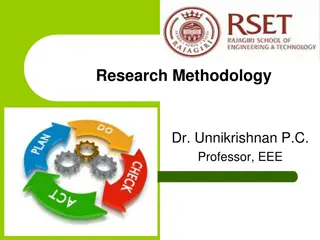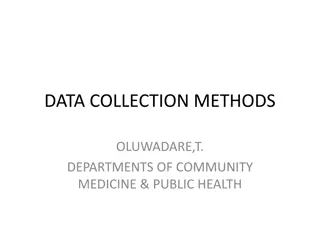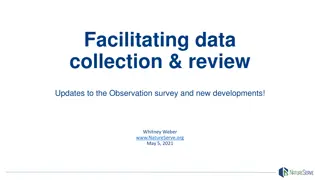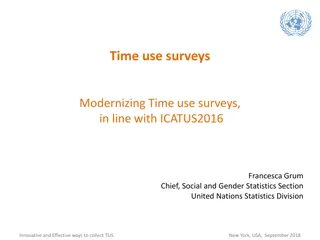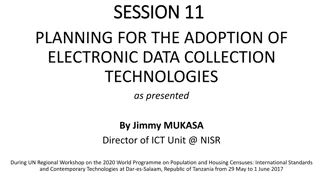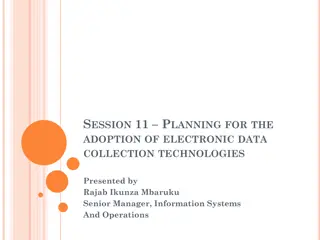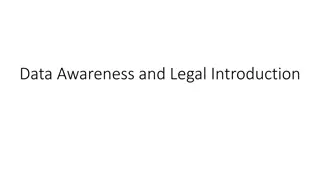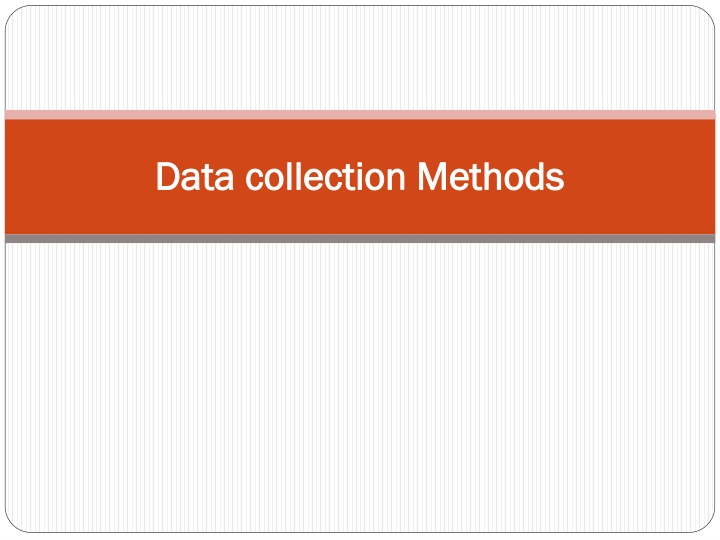
Significance of Data Collection Methods
Explore the vital role of data collection methods in research, ranging from surveys to experiments, and their impact on data quality, relevance, bias reduction, and decision-making. Discover how combining techniques enriches insights and why accuracy matters in research processes.
Download Presentation

Please find below an Image/Link to download the presentation.
The content on the website is provided AS IS for your information and personal use only. It may not be sold, licensed, or shared on other websites without obtaining consent from the author. If you encounter any issues during the download, it is possible that the publisher has removed the file from their server.
You are allowed to download the files provided on this website for personal or commercial use, subject to the condition that they are used lawfully. All files are the property of their respective owners.
The content on the website is provided AS IS for your information and personal use only. It may not be sold, licensed, or shared on other websites without obtaining consent from the author.
E N D
Presentation Transcript
Data collection Methods Data collection Methods
What are Data Collection Methods? What are Data Collection Methods? Data collection methods are techniques and procedures for gathering information for research purposes. They can range from simple self-reported surveys to more complex quantitative or qualitative experiments. Some common data collection methods include surveys, interviews, observations, focus groups, experiments, and secondary data analysis. The data collected through these methods can then be analyzed to support or refute research hypotheses and draw conclusions about the study s subject matter.
Data collection methods encompass a variety of techniques and tools for gathering quantitative and qualitative data.These methods are integral to the data collection and ensure accurate and comprehensive data acquisition. Quantitative data collection methods involve systematic approaches, such as Numerical data, Surveys, polls and Statistical analysis To quantify phenomena and trends. Conversely, qualitative data collection methods focus on capturing non- numerical information, such as interviews, focus groups, and observations, to delve deeper into understanding attitudes, behaviors, and motivations.
Combining techniques can enrich organizations datasets and gain comprehensive insights into complex phenomena. Effective utilization of accurate data collection tools and techniques enhances the accuracy and reliability of collected data, facilitating informed decision-making and strategic planning. quantitative and qualitative data collection
Importance of Data Collection Methods Importance of Data Collection Methods Data collection methods play a crucial role in the research process as they determine the quality and accuracy of the data collected. Here are some major importance of data collection methods. Quality and Accuracy: The choice of data collection technique directly impacts the quality and accuracy of the data obtained. Properly designed methods help ensure that the data collected is error-free and relevant to the research questions. Relevance, Validity, and Reliability: Effective data collection methods help ensure that the data collected is relevant to the research objectives, valid (measuring what it intends to measure), and reliable (consistent and reproducible). Bias Reduction and Representativeness: Carefully chosen data collection methods can help minimize biases inherent in the research process, such as sampling or response bias. They also aid in achieving a representative sample,enhancing the findings generalizability.
Importance of Data Collection Methods Importance of Data Collection Methods Informed Decision Making:Accurate and reliable data collected through appropriate methods provide a solid foundation for making informed decisions based on research findings. This is crucial for both academic research and practical applications in various fields. Achievement of Research Objectives:Data collection methods should align with the research objectives to ensure that the collected data effectively addresses the research questions or hypotheses. Properly collected data facilitates the attainment of these objectives. Support for Validity and Reliability:Validity and reliability are essential to research validity. The choice of data collection methods can either enhance or detract from the validity and reliability of research findings. Therefore, selecting appropriate methods is critical for ensuring the credibility of the research. The importance of data collection methods cannot be overstated, as they play a key role in the research study s overall success and internal validity.



